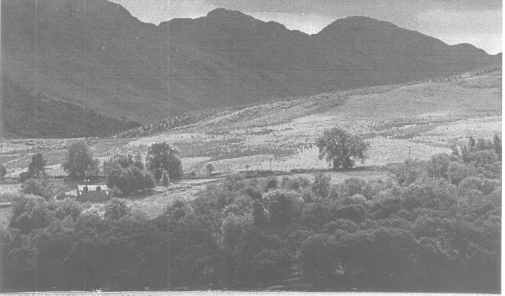Suddenly Jacques, leaning right out of the door, shouted with great enthusiasm:
"Jonathan, she's there at last!"
"Eh, my good friend?"
"The first mountain I've ever seen!"
"Really? Could I borrow her for a while? I promise to give her back."
"Poke fun if you want, but just look. Can you see that indistinct shape on the skyline, a real mountain with her head hidden in the clouds?"
Jacques was right: the first rise of the Skiddaw Hills was just imaginable, as a solitary mound
 disappearing into the mist. The railway thrust its way through
the folds of these mountains, as the countryside completely changed character.
Without transition, it became wild and rough; the valley was forced into a deep
gorge, and the train hurtled along a vertiginous track hanging onto the sides of
those old rocks. This speed had a fantastic quality about it and at each bend,
the carriages seemed on the point of throwing themselves off into the chasms
where black-water rivers roared. Sharp-faced boulders, sad clumps of heather on
the bare soil, an unalloyed solitude replaced the green chirpiness of the
English countryside: it was already the land of the Ferguses and the MacGregors.
disappearing into the mist. The railway thrust its way through
the folds of these mountains, as the countryside completely changed character.
Without transition, it became wild and rough; the valley was forced into a deep
gorge, and the train hurtled along a vertiginous track hanging onto the sides of
those old rocks. This speed had a fantastic quality about it and at each bend,
the carriages seemed on the point of throwing themselves off into the chasms
where black-water rivers roared. Sharp-faced boulders, sad clumps of heather on
the bare soil, an unalloyed solitude replaced the green chirpiness of the
English countryside: it was already the land of the Ferguses and the MacGregors.Jacques and Jonathan could not tear themselves away from this sight. But an hour later the first vision of the Highlands had given way to Lowland plains. Night fell quickly, and the two tourists sat down again, silently letting these new sensations permeate their hearts and minds.
At about eleven, the train stopped at Carstairs Junction, where the route splits, one way leading to Glasgow and the other to Edinburgh. At midnight, under a torrential rain, the travellers, drowsy from exhaustion and darkness, woke up again in the capital city.